How did climate change get so controversial?
Posted on 21 January 2020 by John Cook
An excerpt from the book Cranky Uncle vs. Climate Change, released Feb 25.
Our human brain is poorly equipped to deal with a threat like climate change. Over millions of years, we’ve evolved to avoid life-threatening dangers like predators jumping out of bushes. We’ve survived by quickly detecting and avoiding immediate, short-term dangers.
In contrast, global warming is a slow-motion disaster happening on a global scale. Our brains aren’t built to respond to planetary crises stretched out over a lifetime. It should come as no surprise that people have trouble appreciating just how dangerous climate change is.

On top of all these difficulties, we are also being hit with a massive wave of misinformation about climate change. Vested interests, political polarization, the global nature of climate change, and misinformation combine to form a perfect psychological storm, preventing people from accepting climate science and supporting climate action.
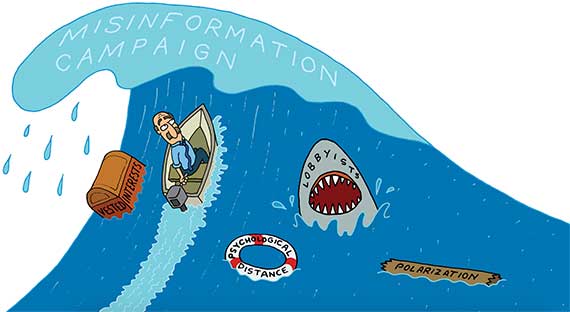
From the public’s point of view, the tsunami of misinformation looks like scientific controversy. We hear experts and contrarians on TV or social media spouting jargon and assume scientists are still undecided on basic questions, like whether humans are causing global warming.
This veneer of controversy conceals the fact that our scientific understanding of human-caused global warming is built on more than a century of research. Scientific confidence is strongest when many different lines of evidence all point to a single conclusion. That’s what we observe with climate change.
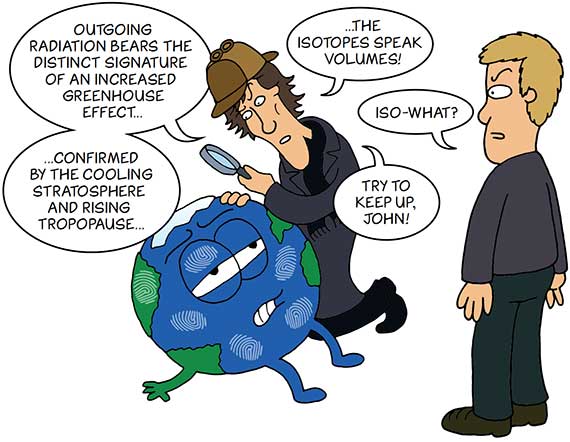
Unique patterns matching human-caused global warming—otherwise known as human fingerprints—have been observed all over our climate. This body of evidence has resulted in overwhelming agreement among climate scientists.
Not only has there been scientific consensus on climate change for decades, there used to be political consensus as well. In the 1980s, George H. W. Bush—head of the Republican Party—pledged to fight climate change.
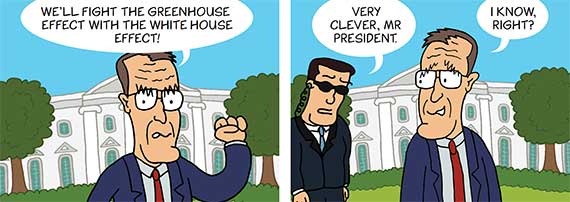
So how did a bipartisan issue turn so partisan? The story begins in the late 1980s. Three physicists began attacking the science linking smoking to cancer, the reality of acid rain, the severity of the ozone hole, and global warming. In short, they tried to discredit any scientific evidence showing that industries were harming the public’s health or the environment.
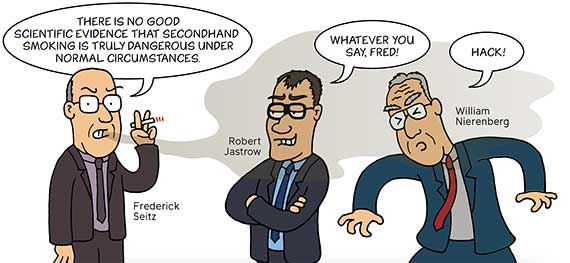
Why did these scientists turn against science? While the obvious suspect is money, it turns out their motives run deeper. They subscribed to a belief system called free market fundamentalism. This ideology holds that capitalism and personal freedom are inextricably linked. Even a small action like a tax on tobacco could be the start of a slippery slope of ever-increasing regulation, leading to government controlling every part of our lives.
The controversy about climate change is not about the science. It’s about how much the government should regulate the marketplace to protect the public. Believers in free markets dislike the implications of the science, so they deny there is a problem in the first place.
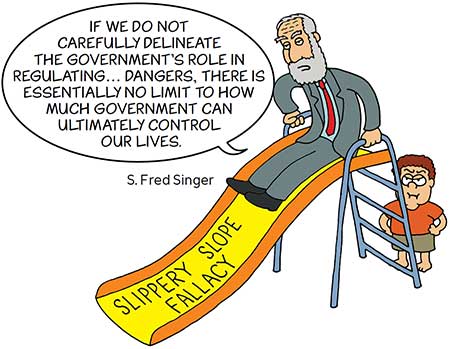
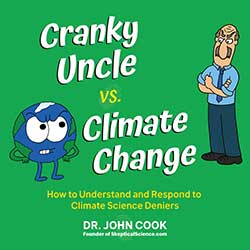 Cranky Uncle vs. Climate Change uses cartoons, climate science, and critical thinking to make sense of climate denial and misinformation. Guided by psychological research into how to refute misinformation, the book embraces a creative approach, using cartoons and visual analogies to make the science engaging and accessible to readers. The book is written and drawn by John Cook, a former cartoonist who now researches climate communication at George Mason University. Cranky Uncle vs. Climate Change will be published by Kensington Books on Feb 25. Sign up for latest Cranky Uncle news at crankyuncle.com.
Cranky Uncle vs. Climate Change uses cartoons, climate science, and critical thinking to make sense of climate denial and misinformation. Guided by psychological research into how to refute misinformation, the book embraces a creative approach, using cartoons and visual analogies to make the science engaging and accessible to readers. The book is written and drawn by John Cook, a former cartoonist who now researches climate communication at George Mason University. Cranky Uncle vs. Climate Change will be published by Kensington Books on Feb 25. Sign up for latest Cranky Uncle news at crankyuncle.com.
Other excerpts from Cranky Uncle vs. Climate Change:
Global warming is happening here and now
Why is the Keeling curve so curvy?
Climate goes extreme!































 Arguments
Arguments
































"How did climate change get so controversial?" - because human egoism. Not only cars and electricity, ALL goods have a CO2 price.
Individual egoism against little problems for all in very far future. What was/is/will win?
Car users say many things, but still use a cars. Same with all others.
takamura_senpai, ego is a factor in all this, but imho there's more to it. You can't expect people to make big changes to their lifestyles when they don't see the entire group doing this, or most of the group. It not a rational response for them to sacrifice themselves for little gain. There's a technical term for this problem but I just cant recall it.
The only way to counter this is probably a strong carbon tax that forces people to all make some sort of change more or less in unison. Unfortunately this comes up against the people with ideological opposition to taxes and they are very influential. Because of this I'm inclined to think we are not going to fix the climate problem, not properly anyway.
Don't have a "peer reviewed study" to back this up and I'm not going to spend all my morning trying to find stuff I've read on it. So if my comment doesn't meet the websites standards I guess just do whatever you want.
I first became aware of the climate controversy in the early 90's. In perticular, Rush Limbaugh teaming up with former Washington State govenor, Dixie Lee Ray who had a PhD in biology. Ray had been sent by Limbaugh and his allies to RIO. I still remember her telling Rush why AGW was bogus. "I'm a scientist. I know!" I remember Rush proclaiming how silly AGW was. As an example he wrongly insinuated that volcano's dwarfed anything man could do.
https://larouchepub.com/eiw/public/1992/eirv19n25-19920619/eirv19n25-19920619_036-dixy_lee_ray_battles_rio_green_a.pdf
"This ideology holds that capitalism and personal freedom are inextricably linked. Even a small action like a tax on tobacco could be the start of a slippery slope of ever-increasing regulation, leading to government controlling every part of our lives."
It's good to see this in the book. It does tend to be US types who most have that particularly extreme notion of 'freedom' though. Not all freemarket or libertarian types do, for example the wonderful Potholer54 (Peter Hadfield) who has done a couple of videos on freemarket solutions to climate change.
I have to say that I think the 'fossil fuel lobbyists are behind denialism' argument is getting outdated. The truth I think is more nuanced despite what the Oreskes' of this world insinuate.
nigelj #2 I think you might mean 'the tragedy of the commons'
My view nowadays is that increasingly since 2007, Big Fossil Fuel no longer directly sponsors denialism. It's not in their corporate material, in their reports or websites. They do, however, contribute to organsations which use denialist memes and rhetoric when lobbying politicians etc but I think this is a separate thing.
My opinion is that the giant energy companies do accept the mainstream science these days but are, justifiably, worried about some of the solutions put forward by extreme environmental activists and some progressive/left leaning politicians which, to 'big business', look like 'communism by the back door'. Professor Katharine Hayhoe is recently actively using the term 'solutions averse' to describe such behaviour. She is now using an approach of researched and justifiable optimism that, without crushing capitalism or using heavy handed Big Government that we can do this - we can solve it.
Nowadays, when tackling a denialist who has proved to be 'solutions averse' I have taken to saying something like:
'If you so scared of the Big Government solutions, carbon taxes etc, why don't you get busy coming up with efficient, economical freemarket solutions to the problme instead of spreading denialst memes and propaganda just because they have been shown to sway the minds of the the voting masses?'
There's another psychological / political factor. The climate issue has become politically tribal. Once the tribe takes on a position on climate, so peoples views become stubborn. Dissension is not tolerated.
I also think that ideally we dont wan't to over do the big government component, because there are some legitimiate concerns there. Yet its very difficult to see how you resolve this mess without things like a carbon tax. So I'm completely stumped over this.
But this is the thing. There are literally a dozen psychological, ideological, political and cost factors that are impediments to change. Plus the climate problem is huge and requires multiple changes. Taking all this together, I don't see mitigation and lifestyle changes adequately fixing the climate issue, or even coming close.
We might be heading towards dangerous experiments with geoengineering, or sucking CO2 out of the air with fans and neutralising it chemically. However I will continue to advocate for the more usual solutions.
Nick Palmer, similar to the tragedy of the commons but theres another name for it.
nigelj, you may be thinking of "the bystander effect"? The more people know about a problem and COULD do something to solve it - whether they actually are or not - the less likely any individual is to step up.
International conferences and treaties and accords are a closer fit to the Tragedy of the Commons, IMO.
It's crazy-stupid that some apparently bright people deny there can be negative externalities: externalities are real, as any serious economist will acknowledge. Moreover, sometimes they aren't exactly external (that is, they affect the persons who ignore them, but later in time). I suspect, as Nigel says, that psychological issues underlie / contribute to the absurd conviction that actual human choices are always rational in the economic sense of that word--in particular, a gut-level desire to go on with BAU.
Mbryson, you are very correct, I think.
The idea of Rational Economic Man is a fiction from the Eighteenth Century, pre-dating the insights from Darwin, Freud, and modern psychology / neurology.
Over decades, Big Tobacco did denialism directly, via entities like Tobacco Industry Research Council, but over time moved to use more and more "independent" entities like front groups, think tanks and most of all, the Tea Party, a joint creation of Philip Morris & Kochs, via Citizens for a Sound Economy. In the 1980s, they also created a network run by GMU's Robert Tollison of academic economists across the USA to writeopeds and testify to local legislatures. That progression is detailed in the peer-reviewed paper I summarized & linked (open access) at Desmog.
Big Fossil has followed the same path. The Kochs seed-funded a large network of thinktanks, have spent much money on academics. Most fossil funding is usually invisible, except for accidents and ExxonMobil Foundation, whose use was silly, because it was publicly visible in IRS Form990 reports and the numbers were rounding error in daily profits. They took flak, which must have amused the Kochs, as they were spending more, so they mostly quit using EMF in the mid-2000s ... but in fact, kept funding some, like ACSH (Desmog, Sourcewatch). Latest numbers I have are $75K each year 2011-2016, for example.
Regarding JM @10, the book to read is Dark Money about The Kochs and others. This review allows you to read some interesting excerpts for free, click on look inside.
Mbryson and others,
It may be more accurate to declare that the pursuit of expanded awareness and improved understanding and the application of that learning to develop sustainable improvements for the future of humanity is not governing human behaviour.
During the enlightenment it could have appeared likely that better understanding would govern. But the competition for status based on popularity and profitability has produced the opposite result. It has developed many harmful unsustainable pursuits that end up being very difficult to correct.
The resistance to correction can be attributed to a variety of things including the concept of Loss Aversion. Loss aversion is the reluctance to accept or pursue a change even if it may be beneficial. But it is more likely that the power of resistance is a desire to not lose any developed perceptions of status or opportunity for benefit even if it can be understood that the status and opportunity are from a harmful unsustainable pursuit.
And it is even more likely that the lack of rapid significant penalty for misleading marketing is the root of the problem. The current winners are not interested in going onto the slippery slope of having harmful unsustainable pursuits excluded from competitions for popularity and profit. And they want to keep more of any winning. They would not like to see Their downward spiral of correction of undeserved status and a future where Their pursuits would be effectively limited to helping develop sustainable improvements for humanity.
Eclectic #9 "The idea of Rational Economic Man is a fiction from the Eighteenth Century"
I think what is left out of economic considerations is that economics assumes that markets work best, and most efficiently, if everyone has 'perfect information' to make decisions with. I can see that if that happened, then markets really would be effective at providing for needs and avoiding dangers. If the world had perfect information about the actual rigidly defined results and timescales of climate policies and the definite results if such policies were not employed, I think it would be very easy for the people of the world to decide what to do
nigelj@11
Dark Money: Excellent suggestion for all! Jane is one of the very best investigative journalists in US, honest, fearless and a relentless digger and teller of truth.
As it happens, I've been looking at Kochs for a long time: search for Koch in Crescendo to Climategate Cacophony(2010)
or look especially at p.47 and then pp.93-95, that shows which funders give money to which organizations that do climate denial. p.96 has summaries: the 3 main Koch-related foundations (there's a 4th, but small) gave much more than Exxon. Of course, at that point I didn't know about the Kochs+allies' money anonymizer DONORS TRUST/CAPITAL FUND, which I only figured out in early 2012, updated later in Fakery 2. See pp.68-76. See also Robert Brulle's more extensive research, summarized in Study Details Dark Money Flowing to Climate Science Denial(2013). Over time, Koch direct funding down, DONORS way up as seen in graph there. Charles Koch always hated having to report recipients of money from his private foundations. Lately, Donor Advised Funds are increasingly used by some to obscure what they're doing, i.e., N donors give money to a DAF, which then writes the checks, but without identifying the sources. Occasionally one can figure that out, but only with luck.
JohnMashey @14 , thanks for that. The picture has been bleak for a long time.
Nick Palmer @13 , it would become a can of worms, to properly define economics (just as it would, to properly define democracy ).
The modern "science" of economics (think Friedman . . . and worse) tends to dismiss externalities and the bigger picture in general. As you are well aware, I'm sure. To a large degree it is divorced from evolutionary darwinism (except social-darwinism !!) and from human neurology . . . and from human compassion.
I am too cynical to accept your "perfect information" hypothesis. The basic problem is that the selfishness aspect of our human nature does override our altruistic tendencies, when we live in the anonymous conglomerates of mega-cities and mega-towns. The healthy sense of community gets diminished.
The old "Invisible Hand" concept worked well at the village level of long ago, but - as history shows us - works poorly in more modern circumstances. Today, the real Invisible Hand is cartels and Facebook and the likes of Cambridge Analytica . . . and insider-trading . . . and the newer forms of the Tragedy of the Commons.
Yet it is the standard economist "religion" that the bus will follow the best road if we push down on the accelerator and take our hands off the steering wheel.
That's a crazy religion. Realistically, we should take a giant lesson from the control systems within the biological creatures that have survived & flourished over millions of years. ~But that would go against the entrenched religious dogma of capitalism & communism & and other -isms.
Ah, getting too philosophical. Sorry.
Nick Palmer says " If the world had perfect information about the actual rigidly defined results and timescales of climate policies and the definite results if such policies were not employed, I think it would be very easy for the people of the world to decide what to do"
Yes, but I'm inclined to think plenty of people would still kick the can down the road and have a big party and to hell with the climate problem. There is nothing to suggest market economics and the invisible hand will lead to sensible environmental outcomes. The market works reasonably well to allocate resources, and encourage innovation and as a mechanism to avoid the problem of dictatorships and communism. That's all it really does. It can't replace sensible government functions. It can't fix every problem. And I'm a fan of free markets in a general sense, but I'm not blinkered about their limitations.
Imho looking after the environment is a complicated value judgement sort of thing that requires a set of laws, or more informal agreements and a lot of complicated trade offs, and analysis, although a lot of its commonsense as well. Personally I like the Obama doctrine "dont do stupid stuff" :)
Nic Palmer @ 4: " It does tend to be US types who most have that particularly extreme notion of 'freedom' though."
Yet is was Europeans like von Mises and Hayek who were its founding fathers.
Ive read Hayeks book "A Road to Serfdom. Its really just a short treatise (thank god for that) arguing central planning of the soviet sort doesn't work because the planners can't possibly have enough information and computing power to process it (the book was back in the 1950s I think) and so free markets with decentralised private ownership work best. I've read quite good arguments that with our better knowledge today centrally planned economies could work as well as private markets, although I think it just goes too much against our natural instinct for private ownership. It would put a lot of trust in a very powerful government.
But I don't recall Hayek arguing that goverment had no role in economic affairs such as environmental regulation. Laissez faire economics like this has a poor record, eg early Victorian England. Economic growth was good but human suffering was terrible, until they slowly introduced child protection laws etcetera.
Scandinavia has a nice model that combines the best of free market capitalism and state control and ownership where this makes sense. There's a reasonable balance between freedom and control. I doubt we will do much better. Their economic and social data is good, and climate mitigation is quite good, and this is the ultimate test of the model. But I phlosophise too much...
The article's thesis would be better supported if it included missteps made by the pro-crisis camp. Bad science reporting, clean energy crony-capitalism, outdated stats in the political arena etc all create paper targets for critics to aim at. It also doesn't help that certain political factions have hitched their freight to the climate issue, arousing unneeded opposition.
When well-meaning people with incomplete information see reporters, businesses and politicians slammed by newer or better facts, then the truth baby can get tossed out with the inaccuracy water. When they see historically unpalatable politics tied to all of the proposed solutions, even neutrals will get their hackles up.
Therefore, the alarmist camp would do well to first admit that not all arguments on its side are correct or helpful, and then actively discourage the overzealous etc from discrediting climate science via sloppy reporting, opportunism etc. The climate cause also isn't helped by political factions who exploit the climate crisis to advance side-causes not necessary to solve climate.
UncleJeff, that's wishful thinking. Deniers have shown over and over their willingness to argue in the most blatant bad faith, against scientific realities that they often don't even understand. I have lived through the "carbonic snow in Antarctica" days, or the averaging of percentages without weighing made by prominent deniers at WUWT. I have seen the Soon & Baliunas fiasco, McIntyre&McKitrick junk. I found the standards of the deniers camp to be essentially non existent.
What you are saying is that there has to be a double standard: deniers can be completely full of it, deliberately lie, misrepresent, cherry pick, harass, misleadingly quote stolen e-mails, threaten opponents, but advocates of a livable future must be perfect, because even honest mistakes will be exploited by deniers. Unfortunately, you're right; that is the current state of this non-debate.
UncleJeff @19
Ouch!
"Bad science reporting"
Yes sometimes, but its not the fault of warmists and scientists. Talk to the media about that one.
The media manage to sometimes get facts wrong, but are reasonably ok on the whole. They exaggerate parts of the climate problem sometimes, yet they also miss the genuinely serious aspects of the climate problem and this is actually a bigger reporting problem. They have false equivalency between both sides of the climate debate, because they are driven by trying to get people to turn the page.
"clean energy crony-capitalism"
Not sure what you mean, but I don't think you can include subsidies for clean energy in this category of crony capitalism. Crony capitalism is favours for industry that simply don't make sense in terms of the public good. Renewables are a public good. Fossil fuel subsidies would fit that definition of crony capitalism better.
"outdated stats in the political arena"
What outdated stats? The stats for 2019s temperatures have just been released and they are the third warmest on record, or something close to that.
"It also doesn't help that certain political factions have hitched their freight to the climate issue, arousing unneeded opposition."
Agree this is a problem. But we are a free society.
"Therefore, the alarmist camp would do well to .... actively discourage the overzealous etc from discrediting climate science via sloppy reporting, opportunism etc. "
Agreed. I do this including when people hugely exaggerate. But then I get labelled a denier for my efforts.